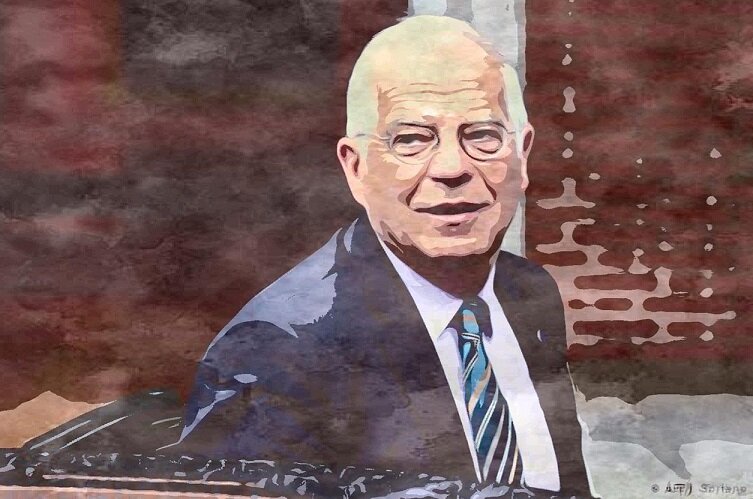EU foreign policy chief says Iran can rightly feel cheated

TEHRAN - Josep Borrell, EU High Representative for Foreign Affairs, said on Thursday that Iran has the right to feel cheated after one of its top nuclear scientists was assassinated in a terrorist attack on November 27.
Responding to a question on whether dialogue could be derailed by the assassination of Iranian nuclear scientist Mohsen Fakhrizadeh, Borrell said, “Well, whoever did it certainly didn’t do it to facilitate dialogue. Certainly, there are people who have an interest in this agreement not surviving, many people have an interest in this agreement not surviving.”
He added, “Europe has been very interested in its survival. I have had to keep it alive, hibernating a little, but it hasn't died. And now we also have to see what the Iranians think because the Iranians can rightly feel cheated. And maybe they are the ones who won’t want to play with the same cards again. But we’ll have to wait.”
Borrell made the remarks in an interview with Euronews.
Also, on Tuesday said the “criminal” assassination of Iranian physicist will not help solve issues pertaining to the country’s nuclear program.
“This was a criminal act … I am sorry to say but this is not the way you are solving problems,” Borrell said at an online debate with his predecessors, Federica Mogherini and Javier Solana, dubbed “The EU in a changing world”.
In his interview with Euronews, the chief European diplomat also answered a question about the possibility to get the United States of Joe Biden to rejoin the 2015 Iran nuclear deal.
He said, “Well, I think I remember in the electoral campaign, the then-candidate and today elected president expressing his intention to resume: to return to the nuclear agreement with Iran.”
Biden said in a mid-September op-ed for CNN that he would rejoin the Iran nuclear deal if Iran returns to compliance with the deal.
“I will offer Tehran a credible path back to diplomacy. If Iran returns to strict compliance with the nuclear deal, the United States would rejoin the agreement as a starting point for follow-on negotiations. With our allies, we will work to strengthen and extend the nuclear deal's provisions, while also addressing other issues of concern,” then-presidential candidate Biden wrote.
Biden has recently pointed out that he still stands by his views on the 2015 nuclear deal that were articulated in the mid-September op-ed. In an interview with The New York Times’ columnist Thomas Friedman, Biden addressed a variety of domestic and foreign policy issues, including the Iran nuclear deal, which President Donald Trump quit on May 8, 2018.
Asked whether he still stands by his views on the Iran deal that he expressed in the September 13 op-ed for CNN, Biden answered, “It’s going to be hard, but yeah.”
In his interview with Thomas Friedman, Biden put special emphasis on Iran’s nuclear program and how to counter it, saying that he will work with Washington’s allies to address the Iran nuclear issue.
“In consultation with our allies and partners, we’re going to engage in negotiations and follow-on agreements to tighten and lengthen Iran’s nuclear constraints, as well as address the missile program,” Biden noted, adding that the U.S. always has the option to snap back sanctions if need be, and Iran knows that.
Biden says it is ‘hard to tell how much’ Fakhrizadeh assassination would complicate dealings with Tehran
Biden reiterated this position in a Thursday interview with CNN's Jake Tapper, saying that the U.S. cannot go it alone on Iran. Biden said it was “hard to tell how much” the recent assassination of Fakhrizadeh would complicate his dealings with Tehran. “The bottom line is that we can't allow Iran to get nuclear weapons,” Biden said before slamming Trump's dealings with Iran, including his 2018 decision to withdraw from the Iran nuclear deal.
“He has pulled out to get something tougher, and what have they done? They've increased the ability for them to have nuclear material. They're moving closer to the ability to be able to have enough material for a nuclear weapon. And there's the missile issues,” Biden said, adding, “All those things, I think, are going to be very difficult. But I know one thing: We cannot do this alone. And that's why we have to be part of a larger group, dealing not only with Iran but with Russia, with China and a whole range of other issues.”
The EU has condemned the assassination of Fakhrizadeh. “On 27 November 2020 in Absard, Iran, an Iranian government official and, according to reports, 1 of his bodyguards, were killed in a series of violent attacks. This is a criminal act and runs counter to the principle of respect for human rights the EU stands for,” a spokesperson for Borrell said in a statement on November 28.
“The High Representative expresses his condolences to the family members of the individuals who were killed, while wishing a prompt recovery to any other individuals who may have been injured. In these uncertain times, it is more important than ever for all parties to remain calm and exercise maximum restraint in order to avoid escalation which cannot be in anyone’s interest,” the statement added.
A day after this statement, the EU External Action Service also issued another statement saying that the Joint Commission of the JCPOA will meet in Vienna on December 16. “Participants will discuss ongoing work to preserve the JCPOA and how to ensure the full and effective implementation of the agreement by all sides, including in preparation of exchanges at Ministerial Level,” the second statement said.
